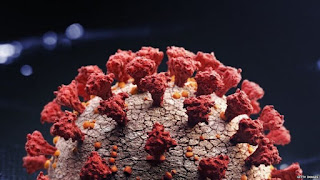Concerns are being expressed around the world about new variants of the corona virus. It is said to be the variant with the most mutations ever. There are so many mutations in it that one scientist has called it scary and another scientist has called it the worst variant ever.
After this, questions have been raised that how contagious this new variant is, how fast it can spread despite the vaccine and what should be done about it.
At present, many speculations are being made about this, but only a few questions have been answered.
What do you know so far?
This variant is being called B.1.1.529 and on Friday the World Health Organization may give it any name like alpha and delta variants were named.
Professor Tulio de Oliveira, director of the Center for Epidemic Response and Innovation in South Africa, says that there are too many mutations in it. It is an "unusual group of mutations" and is "very different" from the other variants.
He said, "This variant has surprised us, it is a huge change against our expectations."
Talking to the media, Professor de Oliveira said that there have been a total of 50 mutations in this and more than 30 mutations have occurred in the spike protein. Most vaccines attack proteins and through these the virus also enters the body.
Talking about the part of the virus making contact with the cells of our body, there have been 10 mutations in it. Whereas there were two mutations in the delta variant, which caused havoc worldwide.
This type of mutation is likely to occur in a single patient who has not been able to fight the virus.
How effective the vaccine
All mutations do not mean that they are bad, but it is important to see what mutations have happened in it.
But, the concern is that this virus is fundamentally different from the original virus found in Wuhan, China. This means that vaccines made with that original virus in mind may be ineffective on this variant.
Some mutations have also been observed in other variants, which may provide some information about their role in this variant.
E.g. N501Y makes it easier for the corona virus to spread. There are some mutations that make it difficult for the antibody to recognize the virus and this reduces the effectiveness of the vaccine. Some mutations are completely different.
"Our concern is that this may increase the ability of the virus to spread from person to person. It may also escape parts of the immune system," says Professor Richard Lessels at the University of KwaZulu-Natal in South Africa.
There are also examples of variants which on paper looked intimidating but did not have much effect. At the beginning of the year, the beta variant became a cause for concern as it was more adept at evading the immune system.
But later the delta variant spread all over the world and caused a lot of trouble.
Professor Ravi Gupta of the University of Cambridge says, "Beta could evade the immune system, the delta variant had infectivity and little ability to escape the immune system."
New variant cases
Scientific studies in laboratories regarding the new variant will clarify the picture, but monitoring the effect of the virus in the real world will give results sooner.
It is too early to draw full conclusions now but early signs raise concerns about this.
There have been 77 confirmed cases in Gauteng, South Africa, four in Botswana and one in Hong Kong. The case of Hong Kong is related to the trip to South Africa.
However, there have also been indications that this variant has spread more rapidly.
Standard tests for this variant are showing strange results (called S-gene dropout) and can be used to track the variant without a thorough genetic analysis.
This suggests that 90 percent of the cases of gouting may already be of this variant. It may already be present in many provinces of South Africa.
However, it is not known whether it can spread faster than the delta variant, how serious it is and how much it can survive the immune system created by the vaccine.
It also does not tell how fast this variant will spread in countries whose vaccination rate is much higher than South Africa's 24 percent vaccination rate.
At present, we have a variant in front of us which is raising our concerns but we have very little information about it.
This variant needs a close watch and one needs to think about what to do when. This pandemic has taught us that we can't wait till all the questions are answered.
India and UK issued guidelines
In view of the seriousness of this variant, India's Union Health Ministry on Thursday directed the states to strictly examine and test passengers coming or going from South Africa, Hong Kong and Botswana.
Health Secretary Rajesh Bhushan, in a letter to states and union territories, has said that India's National Center for Disease Control (NCDC) has informed the government that "new COVID-19 variant B in Botswana, South Africa and Hong Kong". Several cases of .1.1529 have been registered".
"The mutation of this variant is being said to be very high. Therefore, all international passengers traveling to and from these countries and taking transition flights are part of the "at risk" category and are required to undergo rigorous screening and testing.
The Health Ministry has also said that as per the guidelines issued, all the people who came in contact with these international travelers should be closely tracked and tested.
At the same time, Britain has banned flights coming from six African countries amid warnings about the new variant.





0 Comments